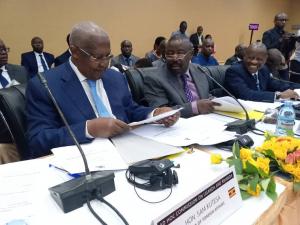
Rwanda-Uganda Relations: Why Rwanda Is Not Interested in Another Commission
Rwanda does not see the need to create a new commission or committee to verify the concerns both Rwanda and Uganda have put on the table, which have led to tensions between two countries, because the Ad Hoc Commission established by the Angola agreement can address them.
Last week on Friday, there was a deadlock in Kampala as the Ad Hoc Commission for the implementation of the Luanda Memorandum of Understanding (MoU) convened to follow up on the recommendations of the first meeting on September 16 in Kigali, but the meeting ended with both sides failing to agree on issues.
The head of the Rwandan delegation, Amb. Olivier Nduhungirehe, the Minister of State for Foreign Affairs in charge of the East African Community (EAC), said in the post-meeting press conference that Rwanda does not believe that creating more commissions would resolve the issues.
“We don’t need to multiply meetings. We don’t need to create commissions. We need to solve issues our people are asking about,” Nduhungirehe said as Uganda’s head of delegation, Foreign Affairs Minister Sam Kutesa emphasised the need for a joint verification mechanism to investigate the issues each country raised.
“We have proposed that there should be a joint verification mechanism where both of us look at each other’s allegations and try to establish the truth because we think this will be the basis of goodwill,” Kutesa claimed.
But has the Ad Hoc Commission established by both countries failed to address the issues? No. Rwanda believes. It is the lack of goodwill on Uganda’s side that has led to lack of progress in tackling the concerns raised by Rwanda.
Ugandan media, led by state-sponsored propaganda website www.softpower.ug, which has been spewing anti-Rwandan government lies over the last two years, now claims that there was a deadlock because Rwanda rejected a neutral commission to investigate the issues.
Amb. Nduhungirehe describes the claims as utter lies and propaganda aimed at deliberately twisting the truth to cover up Uganda’s delaying tactics.
It should be noted that during the meeting, Rwanda raised the issue of propaganda media in Uganda publishing hostile articles attacking Rwanda and giving a platform to armed groups fighting the government of Rwanda.
Nduhungirehe says Uganda never proposed anything like a neutral commission.
“These are lies. Uganda never proposed any “neutral commission”. They proposed a joint verification commission by Uganda and Rwanda. The problem is that we already have a joint commission, which is the Ad Hoc Commission. We can’t endlessly create joint commissions,” Nduhungirehe told KT Press.
The Minister said the matter was extensively discussed during the closed door meeting in Kampala and Rwanda made it clear that forming another committee would be a duplication of the Ad Hoc Commission which was established to specifically deal with the same issues.
“We discussed this extensively. This is just a delaying tactic. We already had a Commission that met twice. We don’t need another commission, we just need to implement in good faith what we agreed on,” Nduhungirehe says.
The matters have now been referred to the heads of state after both sides failed to agree but Rwanda maintains that the move by Uganda to request for a joint verification mechanism would lead to more delays on the same issues which emerged over two years ago.
Rwanda maintains that Uganda has continued to support and engage with armed groups including Rwanda National Congress (RNC) which is said to have a heavy presence in Uganda and has the backing of the Ugandan government and security agencies.
Among the accusations, the Ugandan Minister of State for Regional Cooperation, Mateke Philemon is also accused of being behind or having knowledge of the October attacks by armed groups in Musanze and Burera districts in Northern Province.
Rwanda said there is evidence from the location of the attack linking the elderly politician from Kisoro district to the October 3-4 attack which was carried out by a militia group known as RUD-Urunana, in Kinigi sector, Musanze District, Northern Province.
It is not yet clear when the Presidents of the two countries but President Paul Kagame has previous said that he met Uganda’s President Yoweri Museveni Kaguta several times and addressed the issues directly to him, long before they escalated, but no action was taken.
Among the 7 reasons tabled by Rwanda in Kampala is the continued illegal detention of Rwandans inside Uganda, some of who are unceremoniously deported but more than 1, 400 remain jailed in Uganda.
Rwanda has requested Kampala to extradite the detainees some of whom have been in jail for more than two years or at least try them in courts of law but none of that has happened.
Those who return have told tales of torture, mistreatment and deprivation of property and money. Majority are arrested on claims of espionage or infiltration of Uganda’s security organs but Rwanda denies the allegations saying that those arrested are ordinary citizens going about their businesses while others are Ugandans of Rwandan origin.
In a sarcastic tweet reacting to the propaganda article by Softpower Uganda, Minister Nduhungirehe, quoting a former French Prime Minister Georges Clémenceau joked that “If you want to bury an issue, create a committee”.
